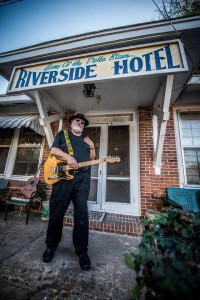 Interview by Barry Kerzner
Interview by Barry Kerzner
American Blues Scene
Mick Kolassa has been on a journey all his life. While he enjoys all genres of music, blues is where his heart lies. There are those who speak of taking care of musicians, and “keeping the blues alive,” and there are people that actually DO everything in their power to care about and care for musicians, and the music they create and perform.
Kolassa gives of himself unabashedly to assist musicians in whatever way he is able, and he does the same to help preserve their music. Currently, he sits on the Board of Directors of the Blues Foundation. He has judged the International Blues Challenge, held each year in Memphis, drawing entrants from around the world. Kolassa is also deeply involved with The HART Fund (Handy Artists Relief Trust), andGeneration Blues.
American Blues Scene caught up with Mr. Kolassa and spoke with him about his recent album Ghosts Of The Riverside Hotel on Swing Suit Records, and his lifelong obsession with music. He also shared his love of the blues and blues musicians, and his work in the blues community with us as well.
Barry Kerzner for American Blues Scene: You had always wanted to be a musician and your father encouraged you quite a bit?
Mick Kolassa:
We just always had music around the house. My dad was a huge Big Band fan, and an amateur at the drums, so he encouraged me to play drums. That was the first instrument I started to play. I moved to a guitar because it was easier to carry around, and it was easier to pick up girls with a guitar than a set of drums!
From the time I was small, both my parents would teach me their favorite songs, and my older sister was into Rock and Roll at the time, so, music was always around me; it was always a big part of me. I can’t remember not being interested in music, so it was just natural. Although nobody in my family was a musician, picking up an instrument and messing around with it seemed a natural thing to do.
I had set my sights on trying to make my living at it, but you get a few years down the road, and you are trying to sing above the crowd noise in a Holiday Inn bar. You look at the other guys doing the same gigs, and they’re so much better than you are, and you’re saying ‘Ifthey’re stuck here, then I am screwed.’
You know, I got to feed my family; I need to do these things so, I stopped pursuing the music. However, even when I was in the Army in the early seventies, in Germany, I was playing every weekend, somewhere. It has always been a part of me. I never put the instruments away. I went off and did other things, but there was always music with it. I was always lucky enough to end up with friends who were musically inclined.
You always have an instrument nearby?
Pretty much. Although, I’m sitting in my office and there’s none here right now, but there are one four doors down that I can grab whenever I need it. Someone gave me a song idea at lunchtime, and I am playing with it already.
You’ve said that your songs often originate from a ‘clever line.’ Would you care to elaborate on that for our readers?
I’m already getting ready for another record the first part of next year, and I have a few songs that fit into that. Earlier this year, I had some stress fractures in my foot, so I had this big kind of brace on, I was walking with a cane, at the IBC in Memphis, running up and down the street. I was hobbling. I was going down a hotel lobby, and this young guy behind me says ‘Can you hurry?’ and I turned around and said ‘My hurry done broke.’ So I said gee, let me write that down, and it’s a song now, ‘My Hurry Done Broke.’ The whole story falls out from that.
Another one. My current album, Ghosts of the Riverside Hotel, has a song that has gotten a lot of airplay called, ‘I Always Meant to Love You.’ BB King was once asked what was his favorite song ever, and he said, ‘The Willie Nelson song “You Are Always On My Mind.”‘ I thought about that, and that’s a great guy’s song, but from a woman’s perspective, it’s pretty sleazy. ‘I was all over the world, doing this and doing that, but honey, I thought of you.’ Shouldn’t there be some level of regret? So I wanted to write a song, where there’s some contrition there or regret. I was going to lunch, and as I pulled into the parking lot of a restaurant, the line hit me, ‘I Always Meant To Love You.’ I already had the idea for the song, without a single word written, but from that phrase, the whole thing came out. OK, here’s what happened. I’m a selfish guy. I always thought a lot about myself, but I always knew that someday you were gonna marry me. And, I just never got around to asking you. So, here I am now; I’m sitting here all alone, and man, what did I do?’ That’s what the song is about. But, from that line, I Always Meant to Love You, from that phrase … it happens pretty frequently.
A line that I have used for years, when it’s just late at night, I’ll say, ‘It’s tired, and I’m gettin’ late.’ It’s just something that I have always said. Don’t remember where I heard it first, but I have been saying it for forty or fifty years. At the Daytona Blues Festival, after spending way too much time jamming and talking with folks, having a quick chat with Victor Wainwright, and I said ‘It’s tired, and I’m gettin’ late,’ and he said ‘Mick, that’s a song!’ and, of course, I said, You know, I never thought of that.’ The next morning, it was a song.
Your current album, Ghosts Of The Riverside Hotel is well rounded and covers a lot of ground. How did the idea for that group of songs come about for you?
My previous album, Michissippi Mick covered a lot of ground, although, it wasn’t quite as wide. I think part of it is that blues is this great big tent, and there’s all kinds of blues, and I love all of it. Rather than feeling the blues as a restrictive musical form, and I have to stay right in here, lot’s of folks do that, which is fine. I just look and say, ‘Well, OK.’ The second song on the album, ‘Grapes and Greens’ is straight Chicago blues. I wanted it to sound as much as Muddy Waters as possible. Fortunately, I have great friends that can make that happen, and we worked through it. But now, that’s followed by a Josh White song, ‘One Meatball.’
For people that really love blues, that’s part of the fun. They’re thinking ‘Oh, this is a Josh White song. Let me go back and listen to HIS version.’
And then listen to ‘Free and Equal Blues,’ and ‘Jim Crow’ and the other things that he did. I’m told that his son Josh Jr. has already heard this version of it, and likes it. This is a song he grew up singing with his dad. That kind of stuff is special. Both of Muddy’s sons have heard ‘Grapes and Greens,’ and say ‘God, that’s Pops. Yeah. Thanks!’ That’s really cool. So, part of it is tipping my hat to these folks when I’m doing their songs or doing one that’s like it.
With ‘One Meatball,’ none of the people who played on it were familiar with that song. I’m playing it; we’re in rehearsals and Victor Wainwright hears us, and says, ‘I don’t give a damn what you say, I’m gonna play on this song.’
So, we worked through it, and because they hadn’t heard it, they were able to bring their feel into it and not try to play it the way Josh did. I tried to stay true to it vocally, but if you listen musically, what Jeff Jensen throws in in the verses, it’s almost reggae. When we get into the chorus, I’m singing ‘One Meatball,’ and Reba Russell is coming in with amazing backing vocals. It has a soft, 1930’s big band feel to it. I love the way it came out. What Victor did with the piano just blew me away. That song is so important to me from where it sits with Josh White. The story is a tragic story, and I wanted to deliver some of that.
There’s plenty of good blues on there for folks to sink their teeth into.
You have ‘I Always Meant to Love You,’ which is a West Coast blues, a T-Bone Walker, Percy Mayfield type of a song. It was done that way on purpose. I was thinking that from the minute I started writing it. The first song on the record is a Hank Williams song.
I discovered Hank Williams and Robert Johnson at about the same time. I appreciated them both, seeing the similarities immediately. This is in 1965, so I was listening to Robert Johnson before I was listening to Eric Clapton. I bought the record, King of the Delta Blues Singers in an appliance store because it looked interesting. I put it on, and I tell ya when it hit the song “Traveling Riverside Blues,” I wore that song out! I played it over and over and over again, just trying to understand what that man was doing on the guitar.
I’m lucky enough, living here in Mississippi, to know guys like Gayle Dean Wardlow, a blues scholar, an old school blues scholar, who started out as a sports writer. He’s the guy that went around collecting 78’s as many as he could, jazz and blues, in Mississippi in the late ’50s and early ’60s. In the Civil Rights movement, here’s this white guy going into black neighborhoods, and every sheriff’s deputy was after him. He’s the guy who uncovered Robert Johnson’s death certificate. He’s got a great book called Chasin’ the Devil’s Music. It’s one of the key books any blues lover needs to read to know what goes on. He’s got some original Robert Johnson 78’s too.
Wow.
Another guy here in town, in Oxford, is Dick Waterman.
Yes, yes. Photographer, promoter, historian, and more.
He rediscovered Son House and Skip James. He found them and brought them back into music. He convinced Bonnie Raitt to go pro. He was Junior Wells and Buddy Guy’s manager. He’s a good friend, and I talk to him on a fairly regular basis. To be able to reach out and touch these guys, and to learn from them is pretty amazing. For as much as I would like to think I know about blues, every time I talk to these guys they’ll say ‘Here’s another song, here’s another story.’
So, what I try to do with my record is try to share that. The Ghost of the Riverside Hotel is the story of the title. It’s a very important building in blues history. It started out in Clarksdale; it was the G.T. Thomas Hospital, the Black hospital in the Delta. Bessie Smith died in that hospital. A couple of years after her death they shut it down, a woman, Mrs. Z.L. Ratliff rented it and ran it as a hotel. A few years after that she purchased it from the Thomas family. It was the Riverside Hotel. It’s where the musicians stayed when they went through town. It’s where Muddy Waters stayed after he got off the plantation until he was ready to go to Chicago. Ike Turner worked out an arrangement to Rocket 88 there. Then they went up to Memphis and recorded it for Sam Phillips. That’s why on the album on Delta Town I sing ‘Stop by the riverside where rock and roll was born, and poor Miss Bessie died.’ Those lines write themselves if you know that history.
One thing that this record has allowed me to do is to share some of that history with blues fans who weren’t aware of it.
In regard to blues singers, you’ve stated, “The blues is real, and their blues is real – they aren’t teenagers talking about puppy love or rock superstar bad boy wannabes who wouldn’t dream of really doing the things they sing about like kicking down doors or carrying a knife – these guys came up through tough times and sing about it without complaining about it.”
A dear friend of mine, who goes by the name of Redd Velvet, is really great at interpreting these songs. I heard her one time, and she said to the crowd ‘I’m gonna sing a song that you all think that you know. She said ‘You gotta understand; the blues is the language of my people. My People had to sing these songs because, they couldn’t SAY these words. I’m gonna do a song by Jimmy Reed, and Y’all think it’s a funny song, but you listen to it and understand he had to sing it, because if he would have said it, he would have been killed.’ Then she sang ‘Big Boss Man.’ Gary Clark Jr., sitting in the audience said, ‘I’ve sung that song a thousand times, and I never thought of that. I’ll never sing it the same way again.’ It’s a funny song, but it’s real. That’s what’s there. If you listen to those songs, that’s what they’re talking about. They are telling stories about their lives, without whining, or ‘pitiful me.’
Blues is such a joyful music. It came out of all that adversity. I love to celebrate that part of it, but also, to do it and treat it right, you need to understand where it came from.
You’ve expressed the opinion: “I’m still optimistic about the future of the blues. As I mentioned there are some great young artists coming up. At the same time, I am concerned that the Blues could become too white – simply because the Blues came out of the experiences and sensibilities of black Americans.” Would you like to clarify that some more for our readers?
It’s a tough thing because I tell the young people I see coming through and playing amazing music, the majority of whom are white. Now, we do have some young black artists, I meanChristone Ingram, ‘Kingfish,’ is amazing. He’s great, and he came out of East Clarksdale.The Delta Blues Museum has had an after school program for years teaching to play the blues. So, there’s a lot of great, great African-American performers, and, there’re an awful lot of great white ones. What happens, and I see it and I try not to go there myself, is that the blues was turned into rock and roll twice already. White people don’t need to do that again.
However, I see things pushing in that direction. If you look at the charts, a lot of what I hear is more rock than blues. It’s a fine line, and it is hard to figure out exactly what or where it is, but, you can’t keep the blues alive by drowning it in an eleven-minute guitar solo. So, I do have that concern that there’s this gravitational force that’s pulling it over to rock and roll. At the same time, I see these young artists, black and white, who appreciate where it came from, and where it can go.
So when I see a sixteen-year-old, or seventeen-year-old that plays with real heart, and the emotion is pouring out of the instrument when they are playing or singing. Look at theLayman kids, Cole and Logan. She’s fourteen, almost fifteen, plays bass and sings up a storm. Cole, her brother, is seventeen. He is an amazing guitarist, and they have been asked to switch over to other forms of music, and they have said ‘No, we play the blues.’ They could probably go there and become huge in another form, but it’s not the music they want to play.
Well, there is the whole idea of credibility.
Joe Louis Walker really said it best when he was inducted into the Blues Hall of Fame. Joe said that ‘You get into the Rock and Roll Hall of Fame by selling a lot of records but you get into the Blues Hall of Fame by being credible. Credibility doesn’t go out of style and it’s not like makeup that you can paint on. Blues is about credibility.’
When people lose it, they lose the blues audience. I remember Joe saying that. It was when he was inducted into the hall of fame. Here’s a guy that was sitting at the top, and he was very humble and he said ‘I’ve been thinking about this a lot.’ and it just really struck me that when I look who’s been inducted into the hall of fame; Big Jay McNeilly. Jay had been inducted on the same night as Joe. So many had never heard of him, and if you had ever seen him, you’d never forget it. Someone like that, and there’s so many. Yeah, it was credibility that got them there. Eric Clapton was just inducted into the Blues Hall of Fame. Some people were angry about it. I think that with what he has done for the Blues, he’s worthy of being there. When we look at the people in there, it’s credibility. There’re a lot of people that are never going to be there, regardless of how popular they were. The Rock and Roll Hall of Fame has Madonna in it. Do you remember anything rock and roll that she ever did?
As anyone who knows you well will attest, Generation Blues and The HART Fund are really near and dear to your heart.
Those are two important causes for me. One hundred percent of the monies from my albums goes to those. So, anytime someone buys one of my records, I don’t get the money, the programs do. HART is an acronym for the Handy Artist Relief Trust, started by Mike Kappus of the Rosebud agency and he gave the first gift that started it. We cover healthcare and funeral expenses for blues artists and their families. Some artists have benefited from it. Last year we lost a great blues pioneer, T-Model Ford. The HART Fund covered all of the out-of-pocket expenses for about the last year of his life. Just recently we lost Smokin’ Joe Kubeck, and the first thing that we did, we being the HART Fund, we made sure that he got home. Janis Johnson, the physician who essentially heads the HART Fund for the foundation, and Paul Benjamin, who is the chairman of the board, got on that right away. Just to relieve the family of the burden of having to deal with that, we got him home.
We have been able to help a lot of people. You know, Walter Trout went through hell, and we were able to help a little bit there.
The Beale Street Mess-around that we do after the BMA’s, that’s a fundraiser for the HART Fund. Again, all of my record sales and when I do my live shows, most of the money is going to go to that. I don’t take any money out of it; I’ll pay the band, and the rest of it is going to Generation Blues.
Generation Blues is the other side of it. Generation Blues provides scholarships to young blues artists, to study with masters in certain programs, like the Pinetop Perkins Masterclass in Clarksdale. We cover scholarships for some students to go there. Our practice is that a hundred percent of the money that comes into Generation Blues goes out that same year in scholarships. So, the more money we get, the kids we send to these programs.
Those are the two programs, The HART Fund and Generation Blues, that get a lot of the focus, and we certainly have a great need for people to donate to those programs.
And of course, there is the Blues Hall of Fame.
Yes, we have the Blues Hall of Fame. We have the Blues Music Awards, which used to be called the Handy Awards. They’re called the Blues Music Awards because the Handy family wants to have control of the Handy name. We also do the International Blues Challenge in January. This January, we expect over 260 acts from around the world to come in for four days of the challenge. That’s amazing! There will be 5000 people on Beale Street, those four, actually five nights, because there’s the showcase and the big jam on the Tuesday of that week. That’s a huge family reunion, and the blues is a family. One thing that is cool is that easily half of the Blues Music Awards winners last year had previously participated in the International Blues Challenge. So, we have this process to help move blues artists along. I’m really proud that the Foundation has been able to do this.
Tell our readers a bit more about the Beale Street Mess Around if you would.
The BMA’s are always on a Thursday night. So, the next day, Friday, we have the Beale Street Mess Around, in the Rum Boogie Cafe on Beale St. Brandon Santini is the host, and I help him manage it. We both perform at it but, we also bring in as many of the nominees and Hall of Famers as we can get down there because a lot of amazing people stop in and participate. It goes for about five hours, and it’s a fund raiser for the HART Fund.
There’s a charge at the door, and we pass the Tip Bucket, but the tips are for the Hart Fund. We also have a fan auction. Last years was an original pressing of the 78 rpm of Muddy Waters’ ‘Hoochie Coochie Man’ from 1954. At that event, we raised $10,000 for the HART Fund. Another thing we always do at that is that we have a guitar, signed by all the performers, which usually goes for a fairly pretty penny. Also, people donate some pretty amazing things as well. The Beale Street Mess Around is followed by another set of showcases that is a fundraiser for Generation Blues. So, you can have 10 or 12 hours of amazing music, so it’s a good time to be in Memphis!
Thanks so much for spending time and sharing your blues perspectives with us. Always a pleasure sir.
You are very welcome. I really enjoyed it.





